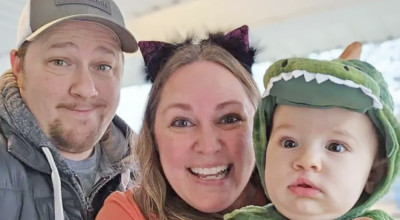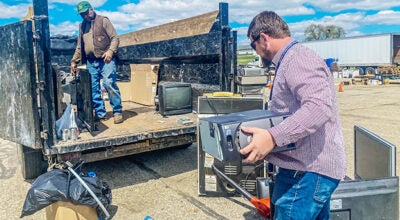Eat That Frog
Published 12:08 am Friday, September 9, 2011

Patti Badner of Kemner-Iott Insurance in Cassopolis talked about how to thrwart procrastination to Dowagiac Rotary Club Thursday noon at Elks Lodge 889.
Patti Badner ate a frog at Dowagiac Rotary Club Thursday noon.
Not literally, but figuratively, for a page-turning, pep-talking, 21-point procrastination program inspired by the book Eat That Frog by Brian Tracy.
Badner, of Kemner-Iott Agency of Cass County, said at Elks Lodge 889, “An average person who develops the habit of setting clear priorities and getting important tasks completed quickly will run circles around a genius who talks a lot and makes wonderful plans, but gets very little done.”
Corollaries might be to devour an elephant a bite at a time.
And if you must consume two frogs, eat the ugliest one first, for it doesn’t pay to gaze at them long.
“In study after study of men and women who get paid more and promoted faster,” Badner said, “the quality of action orientation stands out as the most observable and consistent behavior they demonstrate in everything they do. Successful, effective people launch directly into major tasks, then discipline themselves to work steadily and single-mindedly until those tasks are completed.
To form new habits, Badner counseled, “First, make a decision to develop a habit of task completion. Second, discipline yourself to practice the principles you are about to learn over and over until they become automatic. Third, practice everything you do with determination until the habit is locked in and becomes a permanent part of your personality.”
Napoleon Hill said there is one quality one possesses to win — purpose — knowledge of what is desired and a burning desire to achieve it.
“Only about 3 percent have clear written goals,” she said. “These people accomplish five to 10 times as much as people with equal or better educations and ability but who, for whatever reason, have never taken the time to write out exactly what they want. Effective, productive people discipline themselves to start on the most important task before them. They force themselves to eat that frog, whatever it is. As a result, they accomplish vastly more than the average person and are happier as a result. This should be your way of working as well.”
Badner said of focus, “You should never be distracted by a tadpole when a big frog is sitting there, waiting to be eaten. For you to do something new, you must complete or stop doing something old. Getting in requires getting out. Picking up means putting down. The great question is what one skill, if I developed it, would have the greatest positive impact on my career or life?”
“The biggest enemies we have to overcome on the road to success,” Badner said, “are not a lack of ability or opportunity, but fear of failure and rejection and the doubts that they trigger. You can overcome procrastination and accomplish extraordinary things by just taking the first step. Getting started toward your goal and then taking it one step at a time. The only certain means to success is to render more and better service than what is expected of you, no matter what your task may be. There is no limit to how far and how fast you advance except for limits you place on yourself. Do your work — not just yours and no more — but a little more. Successful people always begin an analysis of constraints by asking this question: What is it in me that is holding me back? Successful people continually put pressure on themselves to perform at high levels. Unsuccessful people have to be instructed, supervised and pressured by others.”
Badner said most people are at their best in the morning, after a good night’s sleep.
“Some people are better in the afternoon. A few are more creative and productive in the evening or late at night,” she said. “A major reason for procrastination is fatigue, or attempting to start a task when you’re tired. You have no energy or enthusiasm and, like a cold engine in the morning, you can’t seem to get yourself started.
“To keep yourself motivated,” Badner said, “you must resolve to become a complete optimist and decide to respond positively to the words, actions and reactions of people and situations around you. You must refuse to let the unavoidable difficulties and setbacks of daily life affect your mood or emotions. Gandhi said, ‘There is more to life than just increasing your speed.’ You will find it easier to do a single small piece of a large project than to just start on the whole job. Most of the really important work we do requires large chunks of unbroken time to complete. Your ability to carve out these blocks of high-value, high-productivity time are central to your ability to make a significant contribution to your work and to your life.
“Don’t wait because the time will never be ‘just right.’ Start where you stand and work with whatever tools you may have at your command. Better tools will be found as you go along. By concentrating single-mindedly on the most important task, you can reduce the time required to complete it by 50 percent or more. The key to all of this is for you to determine the most valuable and important thing you could possibly do every single moment and then eat that frog.”
“I have a big problem with procrastination,” admitted Badner, who read the book to augment monthly sales meetings Kemner-Iott’s three offices, including Cassopolis, have.
Eat That Frog is a book in the Simple Truths series.
Other titles include An Enemy Called Average, Attitude is Everything, Stress is a Choice and Pink Bat — Turning Problems into Solutions.
Pathfinders graduates have received such books as gifts.
Her light-hearted motivational talk resonated with fellow Rotarians, who nodded assent to a point that 80 percent of business originates with 20 percent of clients.
Mike Franks, Badner’s predecessor as treasurer, worked in the insurance business starting in the 1960s.
He recalls it as “one of the most difficult things I ever had to do, going cold to somebody’s door and try to get something going. Procrastinate? Oh, boy. I’d sit in that car and look at that door. I studied all that I could about this problem. W. Clement Stone (who considered cold calls “gold calls”) and Napoleon Hill and some of these authors were a great help to me.
“I spent 17 years in the insurance business and hated every minute of it, but I did it until I finally realized, as she said, do what you want and know what your goal is. I went in the body business and loved it. If you want to take something very simple and make it very difficult, put it off a day,” Franks said.
“Eat a live frog first thing in the morning and you’ll be satisfied knowing that’s probably the worst thing that is going to happen to you all day long.”
— Mark Twain






